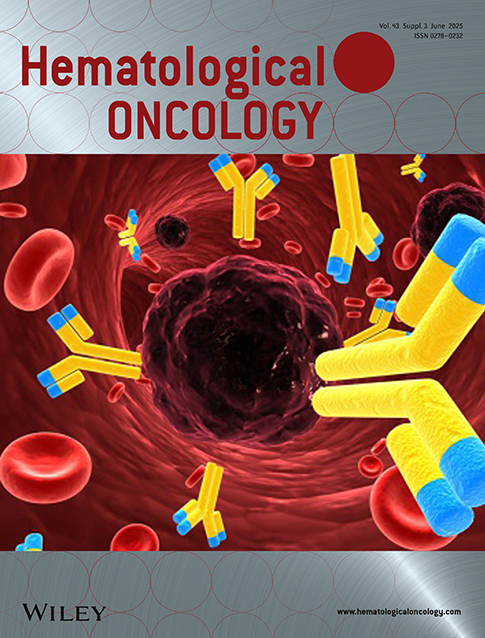259 | IELSG49: A PHASE II TRIAL OF ACALABRUTINIB IN COMBINATION WITH TAFASITAMAB IN PATIENTS WITH PREVIOUSLY TREATED MARGINAL ZONE LYMPHOMAS
Background: Symptomatic patients (pts) with relapsed or refractory (R/R) marginal zone lymphoma (MZL) benefit from systemic rituximab-based treatments. Recently, BTK inhibitors have also been approved for this indication. The International Extranodal Lymphoma Study Group (IELSG) designed the IELSG49 trial to evaluate the safety and efficacy of the anti-CD19 monoclonal antibody tafasitamab in combination with the BTK inhibitor acalabrutinib.
Methods: This is a single-arm, phase II clinical trial with a safety run-in phase for pts with R/R MZL requiring therapy. The study treatment consists of acalabrutinib (100 mg BID, orally) in combination with tafasitamab (12 mg/kg intravenously on days 1, 8, 15, and 22 during the first three cycles, then on day 1 from cycle 4 to cycle 24). The first disease assessment occurs between weeks 11 and 13. Pts achieving complete response (CR) or partial response (PR) and those with stable disease (SD) and clinical benefit continue treatment, while those with progressive disease (PD) or SD without clinical benefit discontinue therapy. At subsequent assessments (end of cycles 6, 12, 18, and 24), pts with PD discontinue treatment. CR rate as best response is the primary endpoint.
Results As of August 22, 2023, enrollment has been completed with 26 pts registered and treated. Demographics: median age 71 (range 57–83); Female: Male = 16:10; splenic MZL (SMZL): nodal MZL (NMZL): extranodal MZL (EMZL) = 10:5:11; Stage I:II:IV = 3:3:20; Median number of prior systemic treatments was 2 (range 1–4). At the data cut-off February 25, 2025, nine pts were still on treatment, eight had completed trial treatment, and nine were discontinued: three due to progressive disease, three due to adverse events (AEs), one of which related to treatment (protracted thrombocytopenia), and one each due to treatment unrelated serious adverse event (SAE), investigator's decision and pt's refusal. Seven grade ≥ 3 AEs occurred in four pts, including neutropenia (N = 3), thrombocytopenia (N = 3), and grade 3 chronic kidney disease (N = 1). All except one (N = 1 neutropenia) were related to treatment. Eight SAEs were reported in five pts, including lung infection in two pts and one each for otitis media, COVID-19 infection, acute myocardial infarction, myelodysplasia, neuroendocrine tumor, and deterioration of general conditions. Only one event of lung infection was considered related to acalabrutinib. In the efficacy-evaluable population, 8/24 pts (33.3%) had a CR, and 10 pts a PR, for an overall response rate (ORR) of 75%. The study is ongoing, and time-to-event analyses will be conducted later.
Conclusion: The combination of tafasitamab and acalabrutinib appears safe and results in high response rates, including high CR rate, in previously treated MZL pts. The safety profile as it has not been approved yet. Updated results will be presented at the meeting.
Research funding declaration: The research was supported partially by AstraZeneca and Incyte (financial support and drug supply).
Keywords: extranodal non-Hodgkin lymphoma
Potential sources of conflict of interest:
M. Tani
Consultant or advisory role: Lilly, Roche, Gilead
Educational grants: Janssen Cilag
M. Merli
Consultant or advisory role: Regeneron Inc., Eli Lilly
Educational grants: Roche, Johnson & Johnson
F. Bertoni
Consultant or advisory role: BIMINI Biotech, Floratek Pharma, Helsinn, Immagene, Menarini, Vrise Therapeutics, Novartis
Educational grants: Amgen, AstraZeneca, iOnctura
Other remuneration: ADC Therapeutics, Bayer AG, BeiGene, Floratek Pharma, Helsinn, HTG Molecular Diagnostics, Ideogen AG, Idorsia Pharmaceuticals Ltd., Immagene, ImmunoGen, Menarini Ricerche, Nordic Nanovector ASA, Oncternal Therapeutics, Spexis AG
D. Rossi
Honoraria: AbbVie, AstraZeneca, BeiGene, BMS, Janssen, Lilly
Other remuneration: AbbVie, Adaptive, AstraZeneca, BeiGene, Janssen: Research Funding
E. Zucca
Consultant or advisory role: AbbVie, BeiGene, BMS, Curis, Eli/Lilly, Incyte, Ipsen, Merck, Roche, Sobi
Honoraria: Medical educational event AbbVie
Educational grants: AstraZeneca, BeiGene, Janssen, Gilead
Other remuneration: research support (Institution) from AstraZeneca, Beigene, Celgene/BMS, Incyte, Janssen, Roche




